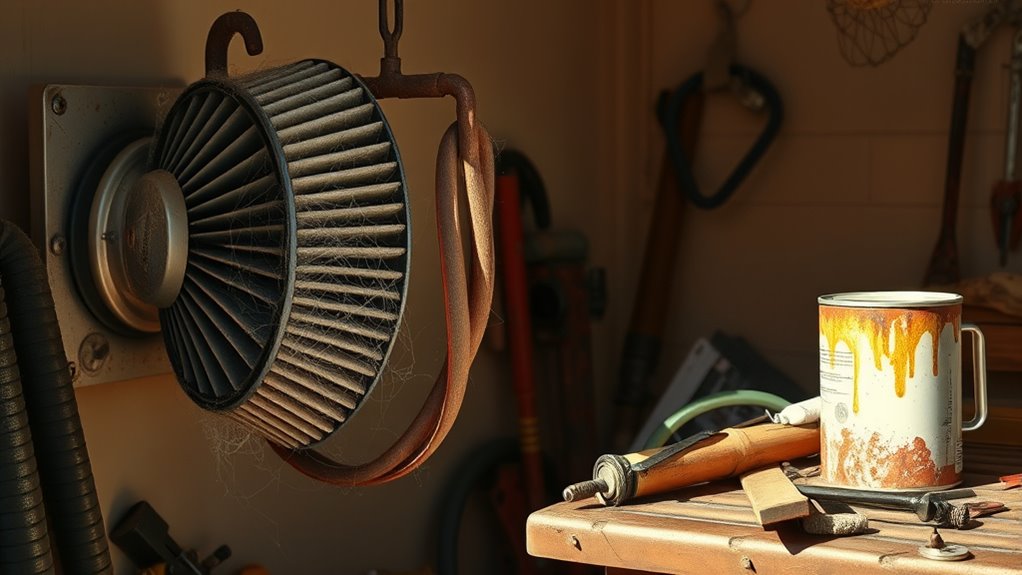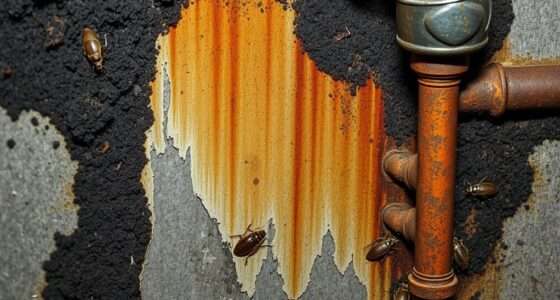Many homeowners forget about regular HVAC filter checks, gutter leak inspections, water heater flushes, smoke and carbon monoxide detector tests, and servicing vehicle belts and hoses until costly problems emerge. Neglecting these tasks can lead to increased energy bills, water damage, system failures, or dangerous safety issues. Staying on top of these essentials prolongs your home’s lifespan and safety. Keep going to discover how you can stay ahead of these overlooked maintenance needs.
Key Takeaways
- Regularly check and replace HVAC filters to prevent system strain and poor indoor air quality.
- Inspect and seal gutters annually to avoid leaks and costly water damage.
- Flush your water heater yearly to remove sediment buildup and maintain efficiency.
- Test smoke and CO detectors monthly, replacing batteries and checking expiration dates.
- Examine vehicle belts and hoses for wear or damage to prevent unexpected breakdowns.
Checking and Replacing HVAC Filters Regularly

Regularly checking and replacing your HVAC filters is essential to keep your system running efficiently. Proper air filter maintenance prevents dust, dirt, and allergens from clogging your system, which can cause it to work harder and waste energy. Make it a habit to inspect your HVAC filter every month, especially during peak usage seasons. If the filter looks dirty or clogged, it’s time for HVAC filter replacement. Using the right filter type and size guarantees ideal performance. Don’t wait until your system shows signs of strain—regular maintenance saves you money on energy bills and prolongs your equipment’s lifespan. Keep your indoor air quality high by staying on top of these simple but important tasks. Regular filter checks are a small effort with big benefits. Incorporating industry trends into your maintenance routine can further enhance your system’s efficiency and longevity.
Inspecting and Sealing Gutter Leaks

Gutter leaks can cause serious damage to your home if left unnoticed, so it’s important to inspect your gutters thoroughly. Start by checking for sagging or loose sections, which may indicate leaks. Use leak detection techniques like running water in the gutter and observing spots where water escapes. Look for cracks or holes along the gutter’s surface, especially near joints. To seal leaks effectively, apply gutter sealants designed for your material, ensuring a watertight barrier. Regular maintenance can prevent issues before they become costly repairs, and staying informed about proper gutter care practices can help extend the lifespan of your gutters.
Inspect gutters for cracks, leaks, and loose sections; seal with appropriate gutter sealants to prevent damage.
Here are four steps to keep your gutters in top shape:
- Inspect gutters visually for cracks or holes.
- Test for leaks with a water hose or leak detection method.
- Clean debris first to improve sealant adhesion.
- Apply gutter sealants carefully to problem areas.
Flushing and Cleaning Your Water Heater
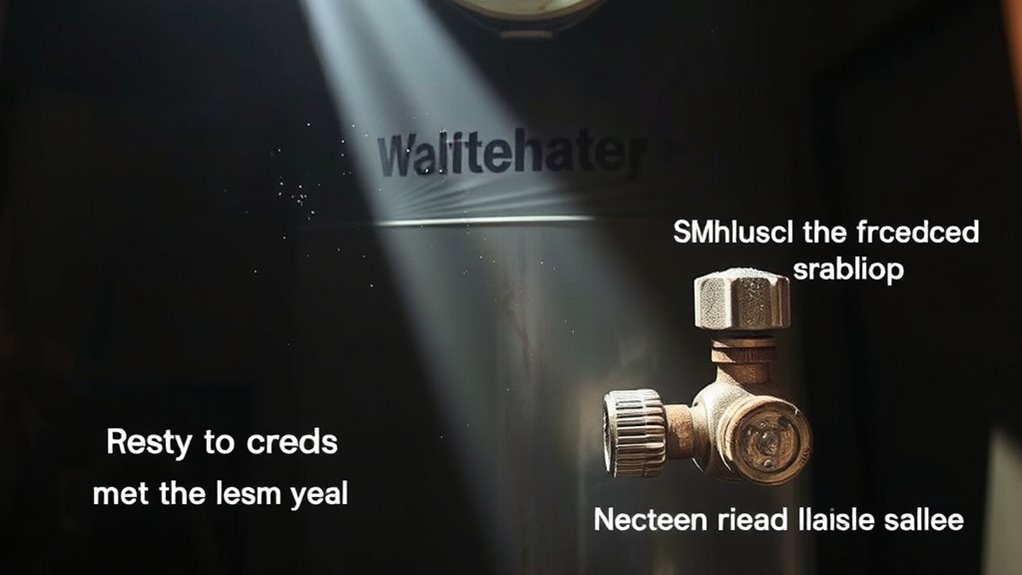
Over time, mineral buildup and sediment can accumulate inside your water heater, reducing efficiency and risking damage. Flushing your tank helps remove sediment buildup that settles at the bottom, preventing corrosion and extending its lifespan. To do this, turn off the power supply or gas, shut off the cold water inlet, and connect a garden hose to the drain valve. Open the valve and let the water—and sediment—drain out. While doing this, perform a tank inspection to check for rust, leaks, or corrosion. Regular flushing keeps sediment from insulating the heating element, ensuring your water heater works efficiently. Sediment buildup can significantly decrease the lifespan of your appliance. Aim to flush your water heater at least once a year for ideal performance and longevity.
Testing Smoke and Carbon Monoxide Detectors
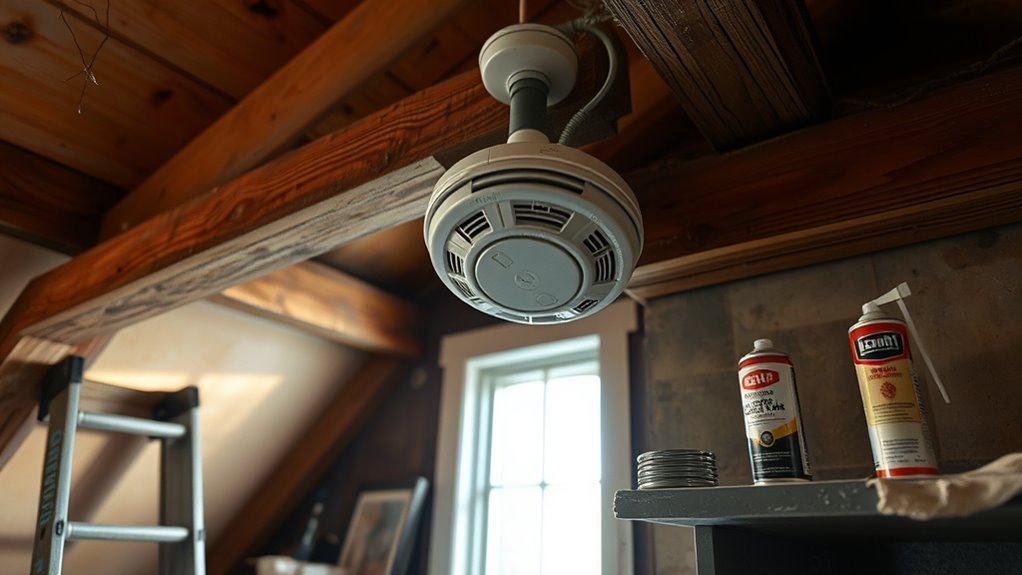
After flushing your water heater, it’s a good idea to check your home’s safety devices to guarantee they’re functioning properly. Regular alarm testing ensures your smoke and carbon monoxide detectors will work when needed. Start by pressing the test button on each detector to confirm they sound. Next, verify proper detector placement—install alarms on every level, especially outside sleeping areas. Remember to replace batteries annually or when low-battery alerts sound. Also, check that detectors are clean and free of dust or debris, which can impair sensors. Finally, review your detector’s expiration date; most last about 7-10 years. Incorporating maintenance tasks into your routine can help prevent issues before they arise. By following these steps, you’ll keep your home safe and ensure your detectors are ready to alert you in an emergency.
Servicing Your Vehicle’s Belts and Hoses
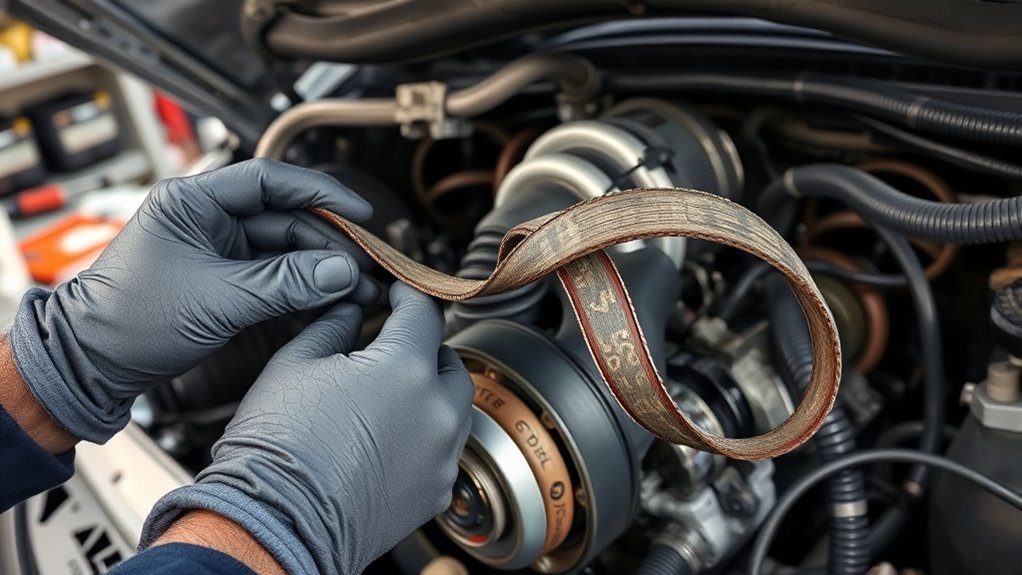
Regularly inspecting your vehicle’s belts and hoses is essential to prevent unexpected breakdowns. During belt inspection, look for cracks, fraying, or glazing that indicate wear. If you notice any damage, it’s time for belt replacement before it snaps while driving. Hoses should be checked for leaks, bulges, or soft spots, which can lead to coolant or vacuum failures. Replace hoses showing signs of deterioration promptly to avoid overheating or engine damage. Don’t wait until a belt or hose fails; proactive maintenance saves you time and money. A simple visual check can reveal early issues, ensuring your vehicle stays reliable. Stay ahead of problems by routinely servicing your belts and hoses, keeping your engine running smoothly and avoiding costly repairs. Additionally, paying attention to visual inspection techniques can help identify potential issues before they escalate.
Frequently Asked Questions
How Often Should I Schedule Professional HVAC Inspections?
You should schedule professional HVAC inspections at least once a year to keep your system running smoothly. Regular hvac maintenance helps catch issues early, improves efficiency, and extends the lifespan of your equipment. If you use your HVAC system heavily or have a complex setup, consider biannual inspections. Consistent professional inspections ensure your system stays reliable and efficient, saving you money and preventing costly breakdowns in the future.
What Signs Indicate Gutter Leaks Before Visible Damage Occurs?
To spot gutter leaks early, watch for signs like water overflowing during rain, sagging gutters, or debris buildup causing blockages. Gutter blockage can hinder roof drainage, leading to leaks. You might notice water seeping into your walls or foundation before visible damage appears. Regularly inspect your gutters for debris and confirm proper drainage. Addressing these signs promptly helps prevent costly repairs and preserves your home’s integrity.
How Can I Tell if My Water Heater Needs Flushing?
You might notice your water heater isn’t performing as well, like inconsistent hot water or strange noises. These signs suggest it’s time for water heater maintenance, including flushing the water heater. Flushing helps remove sediment buildup that hampers efficiency and could cause damage. Regularly scheduling this task prevents problems before they worsen. So, if you see these signs, don’t delay—flushing your water heater is a simple, effective way to keep it running smoothly.
When Is the Best Time to Replace Smoke Detector Batteries?
You should replace your smoke detector batteries at least once a year to guarantee safety. Check the smoke detector lifespan, usually about 8-10 years, and replace the entire unit if it’s older. Keep an eye out for low-battery chirps, which signal it’s time for a battery replacement. Regularly testing your smoke detector also helps confirm it’s functioning properly, giving you peace of mind when it matters most.
How Do I Check for Wear in Vehicle Belts and Hoses?
To check for wear in vehicle belts and hoses, start with belt inspection—look for cracks, fraying, or glazing on the belt surface. For hose assessment, squeeze the hoses gently; they should be firm but not hard or soft. Check for leaks, bulges, or cracks. Regularly inspecting these parts helps catch issues early, preventing breakdowns and costly repairs, so make it a routine part of your vehicle maintenance.
Conclusion
Don’t delay these dull but essential duties; daily diligence avoids disaster. By checking filters, sealing leaks, flushing heaters, testing detectors, and servicing systems, you prevent pricey repairs and prolong your peace of mind. Make maintenance a mindful habit—manage minor matters before they morph into major mishaps. Remember, consistent care conserves comfort, costs, and confidence. Stay vigilant, stay vigilant—your home and health depend on your proactive approach. Don’t forget these forgotten fixes; your future self will thank you.
